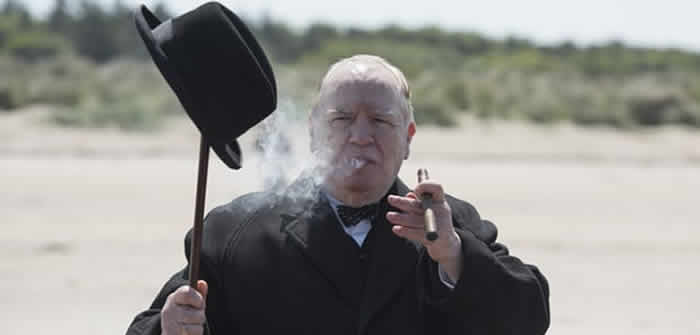The British film production boom, from blockbusters including the new Star Wars trilogy to smaller domestic flicks and European co-productions, has played a role in propping up growth in the UK economy following the Brexit vote.
However, producers – including the backer of a film about that most British of figures, Winston Churchill – have warned that severing links with Brussels will endanger the industry. Lionsgate, which released Churchill in June, worries that Brexit will impede the already complex process of funding, filming and releasing a multimillion-pound product.
One Lionsgate-backed film that might have struggled post-Brexit is Rupert Everett’s directorial debut about Oscar Wilde’s last days, The Happy Prince, now finished and awaiting release. “Lots of films are multi-territory European co-productions, like The Happy Prince for example. It is being made with UK, Luxembourg and German money,” says Zygi Kamasa, the UK and European chief executive of US-based Lionsgate, which makes, finances and distributes films such as the recently released The Hitman’s Bodyguard, which was partly filmed in the UK.
“We currently don’t even know what it means for movies like that once Brexit occurs. What is the opportunity to keep those productions through EU funding? What does it mean for funding those movies? Could there be levies, or issues getting German funding into a British movie, for example? There are risks associated with Brexit.”
Film-makers and financiers also fear that Brexit could see the UK’s role in European co-productions threatened because Britain will not be eligible for support from a €1.4bn (£1.3bn) EU funding pot designed to support films across the continent.

Currently, British productions such as The Wife, starring Glenn Close, and Breathe, Andy Serkis’s directorial debut starring The Crown’s Claire Foy, benefit from an EU programme called Creative Europe. This fund allows British films and European co-productions to receive support that can range from straight funding to a better chance of being aired in cinemas around the continent through a kickback-style subsidy based on ticket sales. Currently, British productions such as The Wife, starring Glenn Close, and Breathe, Andy Serkis’s directorial debut starring The Crown’s Claire Foy, benefit from an EU programme called Creative Europe. This fund allows British films and European co-productions to receive support that can range from straight funding to a better chance of being aired in cinemas around the continent through a kickback-style subsidy based on ticket sales.
Brexit could also affect the attractiveness of British films being picked up for distribution in Europe – for instance in France, which has incentives to screen EU-funded films. Creative Europe has supported the distribution of 115 UK films including Paddington, Pride, A United Kingdom, Suffragette and I, Daniel Blake.
Switzerland-based production company Silver Reel says there is a Brexit scenario in which the UK could lose its status as the lead shooting location on some films if leaving the EU means a loss of eligibility for European film-making perks. Silver Reel has spent more than £500m making more than 35 films in the last decade, including The Wife, Breathe and Hampstead, starring Diane Keaton and Brendan Gleeson.
“All of our work is either pure UK productions or co-productions,” says Silver Reel’s Claudia Bluemhuber. “We need to figure out how UK productions can work as a European production to make sure we can still get them distributed in other European countries. Brexit is going to make it more political. We might have to restructure production in a way that the leading country is somewhere else. That way we could still shoot in the UK but make it more of a service production location.”
So far the air of uncertainty that surrounds the potential impact of Brexit hasn’t affected the UK’s role in European co-productions or the British film-making sector. The weakening currency and huge financial carrot of tax credits for film companies choosing to shoot here continues to make Britain attractive. “For the coming 24 months we are actually looking to increase our activity in the UK,” says Bluemhuber. “The weak pound is good because, along with the tax breaks, we get a lot of production value. We are setting up a new TV and film production company in the UK and investing more.”

Kamasa points out that in financial terms it is the big US studios who are driving the UK film industry, and this accounts for much of the sector’s recent success. Last year, just 18 big-budget Hollywood films accounted for £1.1bn of the £1.6bn spent on all films made in the UK. “The majority of the boom is being driven from US companies coming to the UK – the Marvel films, Star Wars – driven by the UK tax credit,” he says. “That shouldn’t change at all because of Brexit. There is no reason politically or economically why that should change.”
Sources say the government – which paid out almost £600m in tax relief last year to the makers of blockbusters including Baby Driver, Star Wars and the Trainspotting sequel, as well as TV dramas including The Crown – has “no appetite” to make any move against the tax credit system that has fuelled Britain’s movie-making boom.
But Kamasa, who is chairing a BFI commission looking at the health of the film sector, says that Brexit is the latest issue to weigh on the increasingly pressured independent film business. “[Hollywood] is driving so much of the production boom,” he says. “But that doesn’t paint a true picture when looking at the British film industry in its entirety. True British independent film, responsible for films like The King’s Speech, is struggling and could continue to struggle. Those films are eligible for tax credits but the financing, distribution and marketing of those films is getting harder and harder.”
Kamasa says that the move to the fewer-but-bigger Hollywood blockbuster model, coupled with the rise of streaming services like Netflix, is potentially of more concern than the impact of Brexit.
“Studios are going bigger and the sector feeling the squeeze the most is British independent film,” he says. “I’m seeing less of them come across my table and finding it harder to get them financed because of the competition out there.”
Source: The Guardian

